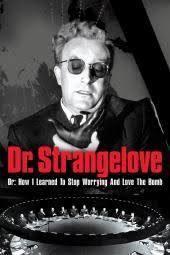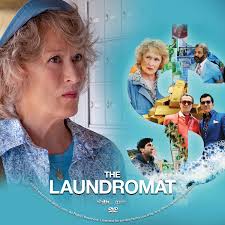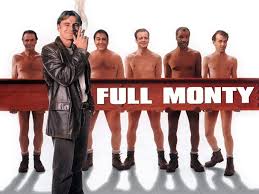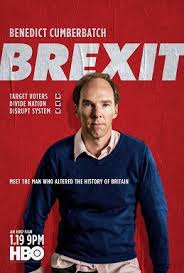Note: This is Part 2 of ‘Politics and economics explained’, an assignment happily entered into for my immediate family and made freely available here to others. The narrative is made more accessible to non-economists as a result of its unreliability and through the addition of references to a number of films which relate to the piece’s subject areas. Part 1 was ‘1940-1960’ and is available on this same blogg.

The scariest thing about living during the Cold War was the possibility of a nuclear war between the Soviet Union and the US. Back then it seemed possible that one or other of those countries might somehow get an unhinged leader who could order a nuclear attack on the other superpower. [Dr. Strangelove. 1964]
By 1960 people seemed to have forgotten the value of having a government lead on commercial activity, and suddenly the only thing that mattered was the profitability of commercial enterprises. When Dr Beeching took over as Chairman of the British Transport Commission in 1964, British Rail was losing £140 million a year. So he closed 4,500 miles of railway line and 2,128 stations. This was one third of the track network and 55 per cent of stations, or the equivalent of six extra seasons of Michael Portillo’s Great British Railway Journeys (on BBC2). These closures led to the loss of 67,000 British Rail jobs – a sort of dress-rehearsal for what was in store for much of the UK’s heavy industry.

Soon after Beeching’s closures people thought they could see light at the end of the tunnel. Unfortunately it turned out to be a train coming in the opposite direction. This was the thundering, unstoppable neoliberalism, a new fashion for western governments that was to dominate politics and economics for half a century and wasn’t really challenged until there was an unexpected viral pandemic.
Neoliberalism was invented by Milton Friedman in Chicago one day in 1967 – and we’re still trying to get over it today. Friedman said that not only was it a bad idea to have governments do stuff, but that government intervention actually does harm. When the economy is slowing down and unemployment rising, the government should sit on its hands and let the central bank manage growth by increasing the amount of money in circulation. This will reduce interest rates and increase spending. (This is ‘monetarism’.)
People were persuaded. After 20 years of controlled economic expansion in which government investment (especially by the US) played a leading role, governments everywhere – Conservative, Liberal, Labour – signed up to ‘monetarism’ and turned their backs on Keynes. [Capitalism: A Love Story. 2009]
Monetarism is a central tenet of neoliberalism which has a particular view of the relationship that a government should have with its people. It holds that free-market capitalism is all the go. It sees competition as the best characteristic of human relations. We are all consumers, not citizens. All of our choices and behaviours and attitudes are best exercised by buying and selling, a process that rewards merit and punishes inefficiency. ‘The market’ delivers benefits that can’t be achieved by planning and ensures that everyone gets what they deserve. Inequality is a sign that things are working well. [Suits. 2011-19]
The successes of neoliberalism include the financial meltdown of 2007‑8, the Panama Papers, the slow collapse of public health and education, resurgent child poverty, the epidemic of loneliness, the collapse of ecosystems, and the rise of Donald Trump. [The Laundromat. 2019] [Sorry We Missed You. 2020]

One of the best practitioners of neoliberalism was Margaret, Baroness Thatcher, Prime Minister of the United Kingdom from 1979 to 1990. She loved markets and put structural change in the UK economy on steroids by closing all the coalmines and steelworks. She also had a wapping victory over print unions and helped Rupert Murdoch buy news organisations and salacious newspapers. [Hack Attack. date tbc] [My Beautiful Laundrette. 1985.]
PM Thatcher famously said there is no such thing as society:
I think we’ve been through a period where too many people have been given to understand that if they have a problem, it’s the government’s job to cope with it: ‘I have a problem, I’ll get a grant.’ ‘I’m homeless, the government must house me.’ They’re casting their problem on society. And, you know, there is no such thing as society. [High Hopes. 1988.]
Between 1984 and 2014 over a quarter of a million coal miners in the UK lost their jobs. In 2014 there were still 5.5 million people in ‘coal mining regions’ who needed financial support. The steel industry was similarly affected. The UK steel industry employed 323,000 people in 1971, but 32,000 in 2019. The fracturing of local communities had serious adverse effects on a whole range of communal activity, including sporting clubs and local orchestras, but these were offset for some people by increased employment opportunities in male strip shows. [Brassed Off. 1996] [The Full Monty. 1997]

From 1997 to 2003 there is stable and fun government in the US. The leader of the Western world and his staff grapple in entertaining fashion with tough issues like modernisation of the US polity, religious fundamentalism, terrorism and the politics of the Middle East. [The West Wing. 1999-2006]
However in response to terrorist attacks on the US, in 2003 President Bartlett’s successor led the United States into war in Iraq. The aims were to punish the Iraqi President for the use of chemical or biological weapons of mass destruction, to install a pro-US government there and to dissuade it and other countries in the Middle East from shielding terrorist organisations. The US was joined in the operation by Australia and the UK. The Iraq War lasted seven years, saw 4,488 U.S. troops killed and cost the US over a trillion dollars. In comparison, World War 2 cost the US $4.1 trillion (inflation-adjusted) and the Vietnam War $738 billion. [Good Morning, Vietnam. 1987] [Platoon. 1986]
In the UK, 1997-2010 is a period of faux socialism during which social-democratic and neoliberal policies and approaches are pretty much indistinguishable. Then, in 2010, David Cameron (a Conservative) becomes the youngest Prime Minister since Lord Liverpool in 1812. As Prime Minister he has two good moments. The first was when he became uncharacteristically firm in negotiations with the US President when he (the President) was caught coming on to his girlfriend. [Love Actually. 2003] The second was when he inexplicably decided to hold a referendum (June 2016) into the UK’s membership of the European Union. [Brexit: The Uncivil War. 2019]

Despite ample evidence from The West Wing, the Panama Papers and a global financial crisis, neoliberalism is still unchallenged as the preferred paradigm for governments throughout The Developed World. It succeeds in reinventing itself time and again through ephemeral schemes like subprime mortgages and less ephemeral ones like the sudden stupendous wealth of Russian oligarchs. All of this means that, in 2016, even someone like a 59-year-old carpenter who has had a heart attack has to fight bureaucratic forces in order to get unemployment benefit. [I, Daniel Blake. 2016] [The Era of Neoliberalism. 2019]
It’s as if the world’s economic order is waiting for some unstoppable natural phenomenon to jolt it into the realisation that it needs to Make Kindness Great Again.

